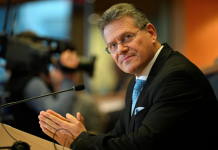American chemicals producer Chemours, the group behind the Teflon brand, has been lobbying harder than any other business to water down a proposed European Union ban on harmful PFAS chemicals, according to a new report by non-profit the Corporate Europe Observatory (CEO).
The chemicals in question — colloquially dubbed “forever chemicals,” because they don’t break down naturally — have been linked to a host of health conditions, including cancer, liver damage and decreased fertility. Studies have found the substances in everything from rainwater and soil to breastmilk and brain tissue.
Chemours has held “more high-level meetings on this topic with the Commission than any other group,” and “more than doubled its declared lobby expenditure in the past year,” the CEO report said. Its tactics include mobilizing other sectors to “raise the alarm on the proposal” in meetings with the Commission and “promoting a weaker scheme as an alternative to a PFAS ban,” it writes.
Chemours said it is “committed to Europe and its future Clean Industrial Deal and has no intention of slowing down the regulatory process,” in a statement to the non-profit.
“Like NGOs and representatives of the civil society, companies and trade associations are also encouraged to submit information, data, facts, figures and positions to regulators and policymakers so they can make informed and data-backed decisions,” Chemours said.
PFAS are used in countless everyday products, including cell phones, contact lenses, and sportswear — as well as in manufacturing technologies deemed critical to Europe’s future, including semiconductors, batteries and various climate technologies.
Industry-heavy German states are also lobbying against strict bans and calling for certain sectors to be allowed to continue using the chemicals, in an effort to protect a struggling chemicals sector, the report found. The findings underscore the EU’s internal dilemma between boosting the bloc’s struggling industry, and protecting communities from potentially toxic substances.
Chemical reactions
Chemours is no stranger to defending PFAS.
The company is a spinoff from American chemicals manufacturer DuPont, which was the subject of a blockbuster film on the legal fight over PFAS pollution in Cincinnati starring Hollywood actor Mark Ruffalo.
In Europe, Chemours has been declared liable for environmental damage caused by the chemicals in four Dutch municipalities. It’s also at the heart of ongoing PFAS pollution concerns in the industrial French town of Villers-Saint-Paul.
Now Chemours has brought that battle to Brussels, after Germany, Denmark, the Netherlands, Sweden and Norway in 2023 proposed phasing out the manufacture, use and placing on the EU market of at least 10,000 PFAS. The move has riled the bloc’s chemicals sector and the many industries depending on the substances, from chip-makers to wind turbine manufacturers.
The associations, companies and sectors lobbying the Commission against the proposal are many and varied, but CEO singles Chemours out as the “most frequent Commission visitor on PFAS.”
Of the 17 high-level meetings with the Commission since January 2023 on the topic on the public record, two were with NGOs and 12 were with the corporate sector. Chemours “held or attended at least six of these meetings,” the non-profit notes.
The company has also tried to coordinate with other industries. In one email obtained by CEO, Dutch company ASML — which provides technology to semiconductor manufacturers — told Dutch officials in Brussels: “Chemours has been trying for months to draw us … into a lobby against the PFAS ban.”
Chemours has secured meetings across various Commission departments, including the Directorate-General for Research and Innovation whom the company pressed for more derogations from the PFAS proposal, adding that otherwise it could “jeopardise investment decisions” in green hydrogen.
One Chemours powerpoint dated October 2023 argues the EU should exempt fluoropolymers — a kind of PFAS — from any such restriction and should instead define the “science-based and most robust and rigorous standards” for the chemicals, creating a “regulatory benchmark.”
Chemours told POLITICO: “We have not advocated for a benchmark instead of a regulation,” adding that it wants EU technical guidance documents on fluoropolymers to “harmonize PFAS emissions in all manufacturing sites in Europe.”
Powerful Freunde
Chemours has helpful allies in German industrial states — despite the fact that Germany is one of the countries behind the original proposal.
Industry-heavy Baden-Württemberg, for example, has been an active player. Its economy minister attended a meeting on the topic back in June 2023 with the Commission’s internal market department, accompanied by industry. The state has also worked with medical technology industry association SPECTARIS, hosting two different events in 2023 and 2024 at its Brussels premises with commissioners and officials from several Commission departments, according to CEO. Baden-Württemberg’s minister for economic affairs, alongside Bavaria’s, expressed “considerable concern” in a letter to Commission President Ursula von der Leyen over the proposal.
The chemicals sector also appears to have a sympathetic ear in the Commission, as Brussels puts increasing emphasis on “competitiveness.”
Both publicly and in the documents obtained by CEO, the Commission has indicated that critical sectors reliant on PFAS need not fear — despite the fact that responsibility for the file currently lies with the European Chemicals Agency.
In a letter to German European People’s Party MEP Peter Liese obtained by POLITICO last year, von der Leyen said the EU executive “intends to propose exemptions for uses that are necessary for the digital and environmental transition and the strategic autonomy of the EU while no viable alternatives are available.”
Those sentiments have been echoed by new commissioners for the environment and the internal market, Jessika Roswall and Stéphane Séjourné. They both want to ban harmful PFAS in consumer uses like cosmetics, food contact materials and outdoor clothing — but for industrial applications with no adequate alternatives, they back continued use under “strictly controlled conditions until acceptable substitutes are found.”
The Commission did not respond to a request for comment.






















